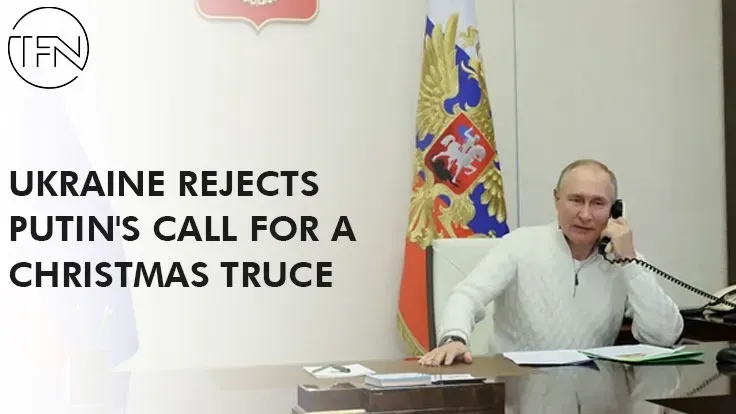Ukraine said there would be no ceasefire until Russia withdrew its soldiers from the seized territory. Ukraine has already rejected a 36-hour ceasefire offered by Russian President Vladimir Putin during the Orthodox Christmas holiday.
As a result of Patriarch Kirill of Moscow, the leader of the Russian Orthodox Church, calling for a Christmas truce, the Kremlin said that Putin has ordered a 36-hour ceasefire beginning at noon (10:00 GMT) on Friday.
According to a statement released by Putin on Thursday, "I instruct the Russian Federation's Minister of Defense to introduce a cease-fire regime along the entire line of contact of the parties in Ukraine from midnight on January 6, 2023, to 24 a.m. on January 7, 2023, taking into account the appeal of His Holiness Patriarch Kirill."
As a result of the significant number of people who reside in the conflict zones, Putin urged the Ukrainian side to announce a cease-fire so that they might attend Christmas Eve and Christmas Day services.
"Russia intends to use peace as cover to hinder our progress in Donbas and bring in additional weaponry," according to Ukraine's President Volodymyr Zelensky.
A top Ukrainian official instantly rejected the idea and said that a ceasefire could only occur if Russia left the region it had seized in Ukraine.
Mykhailo Podolyak, a presidential advisor, said on Twitter that Russia "must leave the seized territory" to establish a "temporary ceasefire." Avoid being hypocritical yourself.
He said that, in contrast to Russia, Ukraine solely destroyed "members of the occupying army on its territory" and did not assault or murder citizens abroad.
President of the United States Joe Biden replied to Putin's request for a ceasefire by claiming that it was only an attempt to give his war effort some breathing space.
On December 25 and New Year's Day, Biden said, "He was ready to attack hospitals, daycare centers, and churches," adding, "I believe he's trying to get some air."
The leader of the Russian Church, Patriarch Kirill of Moscow, issued an appeal earlier on Thursday for a Christmas ceasefire between the warring parties in Ukraine so that "Orthodox people might attend services on Christmas Eve and the day of the Nativity of Christ."
In the Eastern Orthodox Communion, the Russian Orthodox Church is the largest.
There are more than 100 million of its supporters outside of Russia.
The patriarch had earlier defended the conflict as a part of Russia's "metaphysical fight" against Western liberal ideologies, but Ukraine rejected his proposal.
In response, Podolyak said that the Russian Orthodox Church is "war propaganda" and that it encouraged the militarization of Russia and the "mass slaughter" of Ukrainians.
He said that the Russian Orthodox Church's declaration of the "Christmas Truce" was a cynical ruse and a component of propaganda.
Since November, Ukraine's security forces have clamped down on Mosow-affiliated churches and raided places of business that are thought to be aiding the Russian invasion and anti-Ukrainian activities.
Seven prominent clergymen who were purportedly among Orthodox figures believed to have supported Moscow were subjected to sanctions by Ukraine in December.
Turkish President Recep Tayyip Erdogan offered to mediate earlier on Thursday, but Russia and Ukraine made it apparent that there would be no talks between them anytime soon, thereby rejecting Erdogan's offer. Erdogan had individually spoken to both Putin and Zelenskyy of Ukraine.
According to the Kremlin, Putin had informed Erdogan that Moscow was prepared for negotiations, but only if Ukraine would "take into consideration the new geographical realities," which was a reference to Moscow's acquisition of Ukrainian land.
Podolyak of Ukraine deemed such a demand to be "wholly inappropriate."
He said on Twitter that the Russian Federation (Putin) was offering Ukraine and the rest of the world to recognize "its right to grab foreign lands" and "to solve the lack of legal repercussions for mass slaughter on foreign territory."
Russia and Ukraine have both started the new year with toughened diplomatic postures, more than ten months after Putin authorized an invasion of neighboring Ukraine and the seizure of large portions of its territory.
After big successes on the battlefield in the second half of 2022, Kyiv seems more and more certain that it can expel Russian invaders from more of its territory.
After ordering the first call-up of reservists since World War II, Putin, for his part, has shown little interest in talking about giving up his military victories despite growing casualties among his forces.
Erdogan requested that Putin execute a "unilateral ceasefire" during their talk, according to a statement from the Turkish president's office.
Additionally, the Turkish president mentioned a potential cease-fire with Ukraine and said that his country was prepared to broker "permanent peace."
In the past, Erdogan has served as a mediator, most notably by assisting in the negotiation of a United Nations-backed agreement that opened Ukrainian ports to grain shipments. More than once, most recently last month, he had telephone conversations with both Putin and Zelenskyy on the same day.

